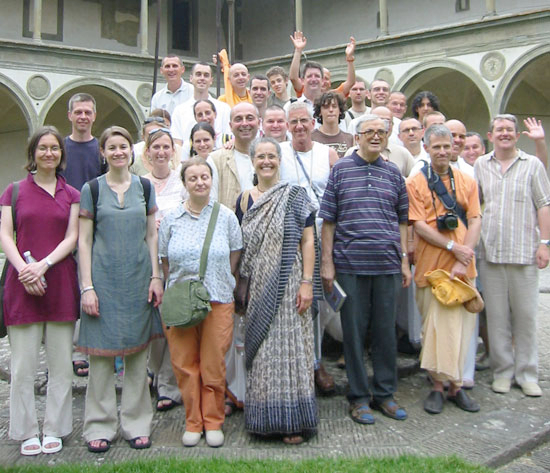Third ISKCON Studies Conference to be Held at Villa Vrindavana
By Madhava Smullen | Июн 05, 2010

Around thirty-five devotee scholars will meet on July 16th to 19th for the third ISKCON Studies Conference at Villa Vrindavana, near Florence, Italy.
The conference—organized by the ISKCON Studies Institute, an ISKCON Ministry of Educational Development approved body—is different from most official ISKCON gatherings, in that its goal is not a managerial one.
“We’re not out to formulate a bunch of resolutions about how to repair ISKCON or anything like that,” says organizer Lal Krishna Dasa. “The point is simply to bring together thoughtful, intelligent devotees—academics in particular—to share what they’ve been learning and thinking amongst like-minded people.”
This year’s conference, for instance, will look at Education, Preaching, and Conversion—three topics central to ISKCON’s history and mission. ISKCON is essentially an educational institution, while preaching—another angle to education—is also at the core of the society’s activities as clearly stated by its founder Srila Prabhupada. Conversion is another prominent and interesting topic.
The conference will look at these concepts in a broad way, discussing how Indic religious traditions, especially the Chaitanya Vaishnava tradition, have understood and articulated them.
Pranava Dasa, for instance—who has just had his doctorate on Prabhupada’s guru Srila Bhaktisiddhanta Saraswati accepted, and who has had access to Bhaktisiddhanta’s diaries—will be speaking about the great spiritual teacher’s views on these issues.
Gopinathacharya Dasa, a Belgian devotee who has just completed his Ph.D at Oxford, will speak about faith within Chaitanya Vaisnavism and Indian theology in general.
Kumaripriya Dasi of Bhaktivedanta College will speak about The Meaning and Form of Conversion in Gaudiya Vaishnava Tradition.
And Shaunaka Rishi Das, a member of the ISKCON Studies Institute, will make a presentation on The Future of Education in ISKCON.
The conference is an open—and open-minded—forum: speakers also include non-devotees who have carefully studied Vaishnava tradition and have something valuable to offer to the discussion. For example Barbara Holdrege, a well-known scholar at the University of California, Santa Barbara, will speak on Meditation as a Devotional Practice in Jiva Gosvami’s Philosophy of Education.
Also a well-regarded scholar and writer, Jan Olof Bengtsson will talk about Conversion, Preaching, and Western Cultural Identity. His presentation will look at how ISKCON is an Indian tradition facing the West, and ask: is it aware of how it appears to Western culture?
Meanwhile Dr. Nick Sutton, who has written and taught extensively about Indian traditions, will speak on Educational Perspectives from the Mahabharata.
Hrvoje Cargonja, a scholar who has done case studies about new ISKCON devotees in Croatia, will present Conversion, Experience, and Narrative: Examples from the Hare Krishnas. “We also want to give a forum for younger scholars, such as Hrvoje and Kumaripriya, to be able to begin to express themselves in a friendly atmosphere,” says Lal Krishna. “And essentially to help them get started in their academic careers.”
The conference will also feature a Panel Discussion called Joining Worlds of Knowledge: Secular and Vaisnava Academies, focused on dealing with the identity of being a devotee in academia.
“Some devotees, for whatever reason, choose to hide their ‘Hare Krishna’ identity by dressing in secular clothes and using their legal names,” Lal Krishna explains. “In many European countries, for instance, they don’t even have a choice—they simply won’t be taken seriously if they walk around in dhotis and tilak. Others are completely the opposite; Tamal Krishna Goswami, for example, wore full Vaishnava dress and always made his identity as a devotee very clear.”
On each day of the conference, presentations will run from 10:00am to 1pm and from 3pm to 6pm, with most attendees starting their day earlier by attending the temple morning program.
“This is our second conference at Villa Vrindavana—we love it because the temple president Parabhakti and the other resident devotees are so supportive,” says Lal Krishna. “Of course, it helps that the venue is a large one, the weather is great, and there’s wonderful prasadam.”
The ISKCON Studies Conference is more than just a gathering of like-minded individuals—its existence is a sign of ISKCON’s growth. “In the early 1990s, there wasn’t really such a thing as an academic devotee,” says Lal Krishna. “ISKCON didn’t always look favorably on people who decided to take academia as their service. But throughout the 1990s and into the early 2000s, it became more acceptable for devotees to study at university.”
And they excelled—not only in their studies and academic careers, but also in their contributions to ISKCON. Professor Radhika Ramana Dasa and ISKCON deity worship minister Krishna Ksetra Dasa, for instance, are currently working on a collection of scholarly articles about the Srimad-Bhagavatam’s influence on dance, music, and architecture at Oxford.
“This will bring the attention of scholars, not just in Oxford but also in Cambridge and Harvard, to the importance and existence of the Bhagavatam,” Lal Krishna says. “Basically, this kind of work makes Vaishnavism a serious topic for intelligent people. It allows people to see that there’s a whole philosophical background to the public front they’re used to seeing, such as devotees chanting on the street.
“And the ISKCON Studies Conference,” he concludes, “is a forum for these devotees to gather, to support each other, and to continue intelligent discussion on important topics.”
Recordings of all presentations at the ISKCON Studies Conference will be available at iskconstudies.org after July 19th. Papers on the topics discussed at the conference will also appear in the third edition of the ISKCON Studies Journal, which will be available for free on the website.
The conference is open for all to attend, and costs 135 Euros including all meals and accommodation for the five nights of July 15th to 19th. For registrations and other enquiries, please contact Kumaripriya Dasi at kumaripriya.dasi@gmail.com















